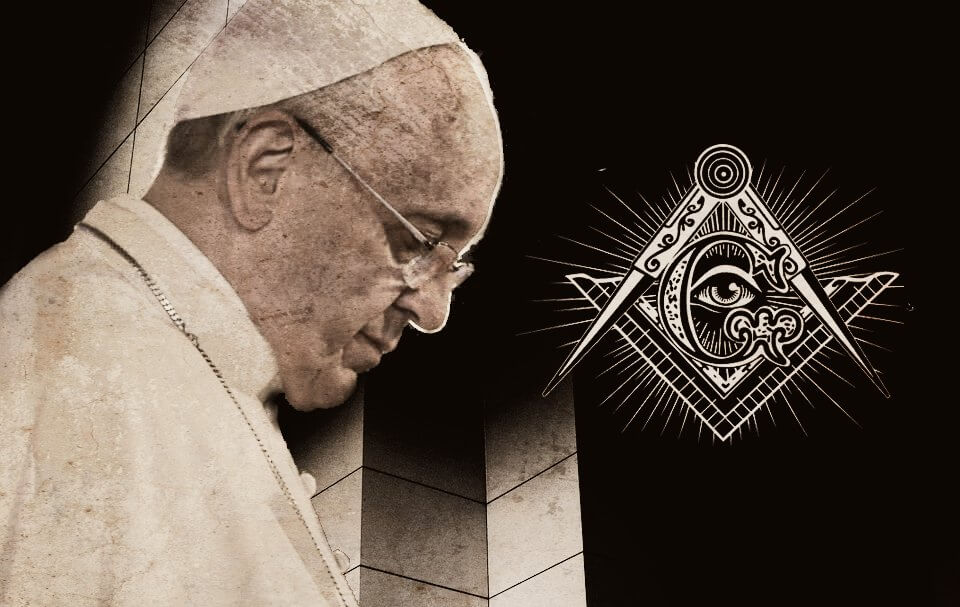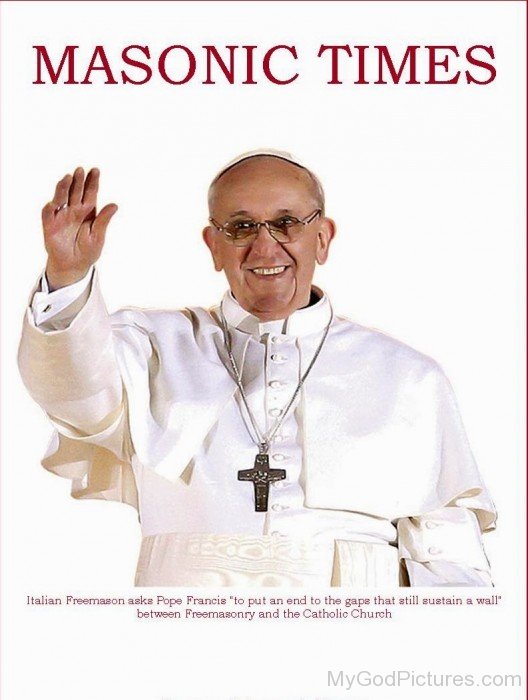Pope Francis & Freemasonry: Vatican's Stance & Controversies
Could the pontiff, Pope Francis, be subtly connected to an organization that has long been at odds with the Catholic Church? The evidence, though circumstantial, paints a complex picture, sparking debate and raising questions about the intersection of faith and Freemasonry.
The whispers began circulating with renewed vigor after a series of events and pronouncements that, to some, suggested a degree of affinity between the current head of the Catholic Church and the tenets of Freemasonry. The notion isn't entirely new. Throughout history, the Catholic Church has maintained a staunch opposition to Freemasonry, viewing its principles as incompatible with Catholic doctrine. Yet, the current papacy, under Pope Francis, has been marked by a willingness to engage in dialogue and, in some instances, seemingly embrace values that resonate with Masonic ideals. This has created a fertile ground for speculation and fueled the ongoing debate.
| Attribute | Details |
|---|---|
| Full Name | Jorge Mario Bergoglio |
| Born | December 17, 1936, in Buenos Aires, Argentina |
| Religious Order | Society of Jesus (Jesuits) |
| Ordained Priest | December 13, 1969 |
| Ordained Bishop | June 27, 1992 |
| Appointed Archbishop of Buenos Aires | February 28, 1998 |
| Created Cardinal | February 21, 2001 |
| Elected Pope | March 13, 2013 |
| Papal Name | Francis |
| Known For | Emphasis on social justice, mercy, and dialogue. |
| Significant Actions | Focus on the poor and marginalized, environmental advocacy, reform of the Vatican's financial systems. |
| Reference Website | Official Vatican Website |
One of the primary points of contention lies in the perceived alignment between Pope Francis's vision and certain Masonic principles. The pontiff's emphasis on the centrality of the person, respect for the dignity of every individual, the construction of a community of solidarity, and the pursuit of the common good all hallmarks of his papacy find echoes in the philosophical underpinnings of Freemasonry. This overlap, however, is where the debate begins. Critics argue that such similarities are superficial and fail to account for the fundamental differences between the two entities.
The Catholic Church's stance on Freemasonry is rooted in centuries of opposition. Pope Clement XII, in the 18th century, declared Freemasonry an excommunicable offense, a position that has been reaffirmed repeatedly throughout the Church's history. More recently, in a document signed by Pope Francis and the DDF Prefect, Cardinal Victor Manuel Fernndez, the ban on Catholics engaging in Masonic associations was reiterated, stating that such engagement is deemed a grave sin. This reaffirms the Church's long-standing opposition. Bishop Antonio Staglian, in an interview with Vatican News, went further, labeling Freemasonry as a heresy fundamentally aligned with the Arian heresy, intensifying the Church's negative view.
Adding fuel to the fire are specific events and pronouncements. On March 14, 2013, the very day after Pope Francis's election, the Grand Master of the Grand Orient Masonic Lodge of Italy delivered a speech congratulating Jorge Bergoglio on his win. He expressed his appreciation for Cardinal Gianfranco Ravasi's overtures to Freemasons made in a 2016 open letter, while also lamenting the pace of dialogue and reconciliation. The Grand Master's remarks, and the subsequent criticism of the Vatican's perceived lack of inclusivity, have been seized upon as potential evidence of an existing, though perhaps frustrated, relationship.
The narrative gains further complexity when considering the broader historical context. In 1961, the Blessed Virgin is said to have spoken to visionaries in Garabandal, Spain, about ecclesiastical Freemasonry within the Church, specifically about cardinals opposing. This purported revelation adds a layer of prophecy and intrigue to the discussion, suggesting that the issue transcends mere theological debate.
The controversies surrounding Pope Francis and Freemasonry are not limited to the Vatican itself. In November 2020, in Dumaguete, Philippines, freemasons broke ground for a Masonic obelisk dubbed "Dumaguete Tower" on a public park across the diocesan cathedral. The project, funded by the Masons, further highlights the presence and activities of Freemasons in Catholic communities, leading to local controversies about the appropriateness of such displays in proximity to religious institutions.
Furthermore, the role of handshakes and informal interactions has also been brought into question. The "curious handshakes" between Pope Francis and Benedict XVI have been scrutinized, particularly the manner in which the hands are placed or hidden during these encounters. While open to various interpretations, these details, for some, represent a form of hidden signalling. Such observations, no matter how speculative, underscore the emotional, as well as theological, complexities surrounding this subject.
The accusations, however, have their detractors. The theory that Pope Francis is a Freemason, they say, gains traction from a photograph taken in 2008 by Argentinian photojournalist Pablo Leguizamn. The image shows Francis, then Archbishop of Buenos Aires, riding the subway, notably with his right hand tucked. These observations have added weight to the claims, even though they may have been a matter of circumstance.
The central question revolves around the incompatibility of Catholicism and Freemasonry. The Churchs long-standing position, reaffirmed by Pope Leo XIII in the late 19th century, is that Christianity and Freemasonry are irreconcilable. The Church views Freemasonry as a movement that promotes naturalism and religious indifferentism, which conflicts with the Churchs claims of religious truth and the importance of divine revelation.
Furthermore, the response of Freemasons themselves adds another layer of complexity. While the Church continues its condemnation, some Masonic groups have been reported to welcome Pope Francis, framing his actions and words in terms of a shared vision. This is often seen as proof of the Church being "invaded." These groups are often perceived as seeking to integrate themselves within the Churchs framework and potentially exploit the pontiffs progressive stance for their own purposes. The concept of a "false prophet" and the idea of Freemasons planning the final stages of persecution of Catholics have been invoked by some critics.
The declaration by the Congregation for the Doctrine of the Faith (DDF), which was released shortly after the election of Pope Francis, further clarified the Church's position. Despite any change in wording, the declaration reaffirmed the church's opposition to Freemasonry and the prohibition on Catholics joining Masonic associations, thus closing the door on the possibilities of aligning the ideals and practices of the Church with those of Freemasonry.
Despite the controversy, the Vatican has repeatedly denied any connection between Pope Francis and Freemasonry. However, the persistence of the accusations and the specific instances cited continue to raise questions and fuel speculation. The fact that the Church, under Pope Francis, acknowledges the presence of Freemasons and reiterates its prohibition underscores the enduring tension between the two groups. The death of Pope Francis, if it were to occur, is expected to be marked by a series of events, which, like his pontificate, will be interpreted differently by the faithful, both supporters and detractors.


